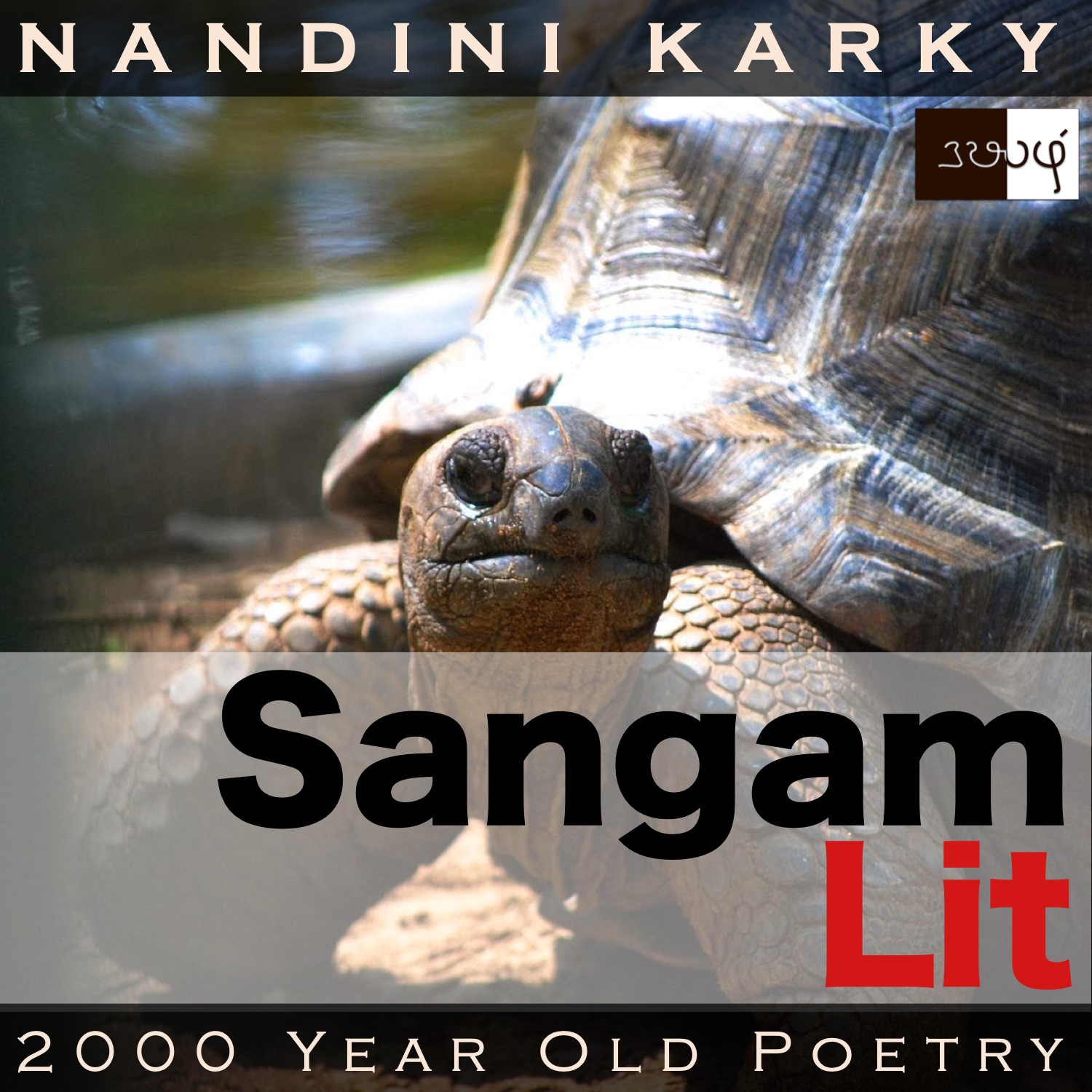Podcast: Play in new window | Download
Subscribe: Apple Podcasts | Spotify | Amazon Music | Android | iHeartRadio | TuneIn | RSS | More

In this episode, we relish an unfinished poem with lines lost in time and yet, shining timeless with the words it contains, as portrayed in Sangam Literary work, Natrinai 385, penned by an anonymous poet. The verse is surmised to be in the ‘Neythal’ landscape or coastal regions and thought to speak in the voice of the confidante to the man, possibly pressing him to seek the lady’s hand in marriage.
எல்லை சென்றபின், மலரும் கூம்பின;
புலவு நீர் அடைகரை யாமைப் பார்ப்போடு
அலவனும் அளைவயிற் செறிந்தன; கொடுங் கழி
இரை நசை வருத்தம் வீட, மரமிசைப்
புள்ளும் பிள்ளையொடு வதிந்தன; அதனால்,
பொழுதன்றுஆதலின், தமியை வருதி:
எழுது எழில் மழைக்கண்…………..
Opening with the words ‘எல்லை சென்றபின், மலரும் கூம்பின’ meaning ‘the day has gone and the flower has closed its buds’, the verse reveals the time of the day and shades the verse in the hues of dusk. ‘புலவு நீர்’ means ‘waters that smell of meat’, no doubt referring to the abundant availability of fish in those waters. Then, we meet with ‘யாமைப் பார்ப்போடு’ meaning ‘along with the little ones of a tortoise’ as well as the ‘அலவன்’ or ‘crab’ on these shores. When I first read the phrase ‘யாமைப் பார்ப்போடு’, I thought the poem was referring to ‘a tortoise and its young ones’ but I remembered reading that once a female tortoise lays its eggs, its work is done and the hatchlings are left on their own. Then, the image changed in my head erasing the mother tortoise and just leaving those hatchlings and crabs in the scene. The phrase ‘இரை நசை வருத்தம்’ is a curious one for it talks not just about hunger or ‘the desire to eat prey’ but also characterises it as a ‘sorrow’. Another familiar image of this region appears in ‘மரமிசைப் புள்ளும் பிள்ளையொடு வதிந்தன’ meaning ‘the birds are resting in the trees along with their little ones’. The most significant words in the verse are ‘தமியை வருதி’ meaning ‘you have come alone’ and we’ll delve into that shortly. The last words left behind are ‘எழுது எழில் மழைக்கண்’ meaning ‘those painting-like, moist rain-eyes’, for sure talking about the lady and the emotions in her heart.
The context of this song is pure conjecture! It’s assumed that the man and lady had been leading a love relationship and the man had been trysting with the lady for a while. One evening, when the confidante sees the man, she says to him, “After the day has gone, the flower has closed its petals. On the nesting grounds near the waters that waft with the scent of meat, the tortoise hatchlings and the crabs have retreated into their holes. As the curved backwaters had abated their sorrow owing to their need for prey, the birds too have returned to their nests with their young. And that’s why this is not the right time and yet, you come alone. Those rain-like eyes that shine with the beauty of a painting…” Following the trail of these unfinished words, we can assume that the confidante is telling the man that he needs to change his ways and seek the permanent path to happiness.
Now, let’s dwell a little longer on what’s left of this song! The confidante first talks about the flower buds closing now that the day has gone. Just like how the poets of yore have observed this sleepy act of the flowers and have often added it to their imageries, scientists of today ponder on the reasons why. Curiously, they call this natural behaviour ‘nyctinasty’. What a name for such an elegant act! Some of the reasons the scientists give for this behaviour of the flowers is that they do this to keep the pollen from becoming wet with the night’s dew, as dry pollen is easier to be disbursed than wet, sticky ones. Also, the creatures that do the disbursing are more active in the day than night and why waste the energy, the flowers seem to think! Another reason that I read was that the closing of buds made it easier for the preying birds and nocturnal carnivores to spot the flower-munching herbivores, perhaps the rats. This is surely ‘nasty behaviour’ to the rats and perhaps the scientists have named this behaviour from the point of view of those affected rodents! Returning to the verse, we find the confidante has turned her attention to the tortoise hatchlings and the crabs retreating to their holes. The confidante also talks about the birds, which have satisfied their hunger with the plentiful catch of fish in the backwaters, and are now resting in their nests on trees, spending family time with their little ones.
Then, the confidante comes to the crux of the issue and says that this is why this isn’t the right time. She also pointedly tells the man that he has come alone too. Why isn’t it the right time and why mustn’t the man come alone? This can only mean that the lady cannot meet with him just then and the man should have come with the elders in his family to seek the lady’s hand rather than still persisting in trysting with the lady. With that image of buds closing, the confidante talks about how the lady will pine when the man leaves after his tryst and using the image of birds returning to their nest of young ones, she points the man to a future with the lady and his children. This fine friend of the lady leaves us with the final image of the moist eyes of the lady, whose eyes are akin to a painting. Like unsaid words and unrequited love, what those eyes are saying leaps on the little dots of an ellipsis to eternity…




Share your thoughts...